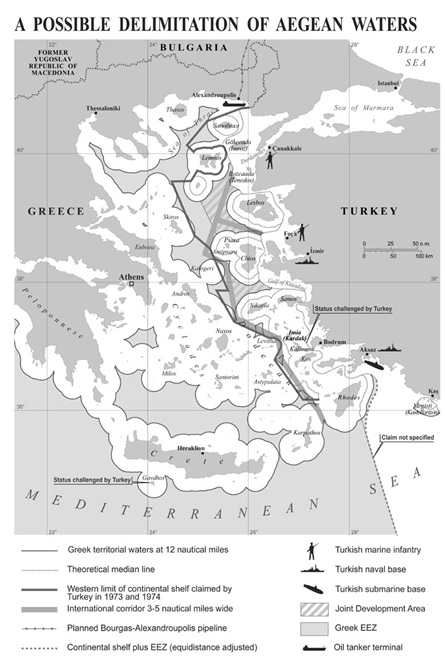Aegean Sea issue and refugee crisis
Moratorium
A legally authorised suspension of activities. It was established between Greece and Turkey during the late 1980's on Military interference between the Air and Naval forces of the two countries.
Turkey-Greece Affairs
Over the last few years, Turkey has totally forgotten the term “good faith bi-lateral affairs”.
Even when their ex-Prime Minister Ecevit officially announced that they do not have any territorial claims against Greece, their actions proved the exact opposite. Diplomacy channels speaking lies while military channels prove the reality.
Conflict Area*Aegean Sea
Under International Law of the Sea, Greece has extended its territorial waters around the Archipelagos to 6 nautical miles from the Act of September 1936. Greek territorial waters thus cover 43.5% of the Aegean Sea, while Turkish territorial waters represent only 7.5%.
If the territorial waters of the two countries were brought to 12 nautical miles, 71.5% of the Aegean Sea would be under Greek sovereignty, and 8.7% Turkish. If the two countries established Exclusive Economic Zones, the remaining space (19.7%) would fall entirely under the jurisdiction of Athens.
Also, the United States opposes Greece's right to extend it to 12 nautical miles, as this will interfere in US’ naval operations in the Mediterranean.
The issue on the size of territorial waters has consequences for the airspace, which in general covers the territorial waters. Athens considers that its airspace measures 10 nautical miles around its territory but Ankara only recognizes 6 nautical miles.
Hundreds of billions of dollars worth of oil and gas are trapped under the seabed around Greece (Aegean sea, Ionian sea). Turkey is deliberately being provocative in order to be able to proceed with mutual exploitation and have economic benefits from these natural resources.
But where there is oil, gas, and minerals, there is always conflict.
Several countries are proposing ideas to stop the conflict between these two NATO countries, but strangely their ideas always involve Greece stepping back and Turkey stepping forward, in terms of sea borders-air borders (Flight Information Regions (FIR), - gas and oil benefits etc. As you can see on map Νρ. 2 below, this was another proposal in order to stop the two countries disputing over the Aegean. Cutting the Aegean almost in half, losing Dodecanese sea-air dominance and making the former “grey zones” of their hostile plans to be “legally” accepted and applied. The Turkish government has avoided stating exactly which islets it wishes to include in this category. On various occasions, Turkish governmental sources have indicated that islands such as Pserimos, Agathonisi, Fournoi and Gavdos(situated south of Crete) might be included.
In a 2004 publication by Turkish authors close to the Turkish military leadership, the following (among other, even smaller ones) were listed as potentially "grey" areas:
•Kalogeroi,
•Antipsara (west of the islands of Psara and Khios),
•Pontiko (between Samos and the Turkish coast),
•Fournoi,
•Arkoi,
•Agathonisi (Gaidaros),
•Pharmakonisi,
•Kalolimnos (near Imia),
•Pserimos,
•Gyali (between Kos and Nisyros),
•Kandheliousa (south of Kos),
•Sirina (SE of Astypalaia)
While Turkey has not made any attempt to challenge the Greek possession of these islands on the ground, the claims add to the number of minor military incidents, already numerous due to the 10-mile airspace and the FIR issues. The Turkish Air Force has reportedly adopted a policy of ignoring Greek claims to all airspace and territorial waters around such formations that it counts as grey zones.
According to Greek Military HQ, the number of airspace violations within the 6-mile limit recognised by Ankara rose sharply in 2006, as did the number of unauthorised Turkish military flights directly over the Greek islands. Renewed reports of systematic Turkish military flights directly over Greek islands like Pharmakonisi and Agathonisi are made often.


Turkey and the Refugee crisis
Turkey has a huge responsibility towards Europe and the Middle East since her relationship with ISIS has proven to be more than friendly and co-operative. Thousands of people are entering Turkey in order to avoid war, although Turkey is creating much of the issues since Turkish Airlines have reportedly announced very low cost flights for immigrants to reach their country from North Africa in order to send them to Greece and Europe. Also, it is proven that many illegal immigrants of Turkish origin are being sent to Thrace in order to expand the Muslim-Turkish populations there, which is against various peace treaties.
According to sources, the Greek Prime Minister conveyed the government's dissatisfaction to the NATO Secretary General for the fact that the involvement of NATO has not yielded the expected result - the flow of refugees continues unabated in Turkey.
During the telephone conversation, the prime minister expressed his displeasure at the attitude of Ankara and stressed the need to adhere to commitments made to the neighboring country in the context of the Agreement on NATO activation and the EU agreement terms with Turkey. Mr. Tsipras had a similar telephone conversation with Chancellor of Germany Angela Merkel, asking for the immediate implementation of the agreement and support in logistical level.
Despite all the negative actions of Turkey, NATO and the EU applaud them for being a good ally and performing excellently during the refugee crisis. It seems that when you pretend to be the rooster (Erdogan), the chickens will bite the bait.


